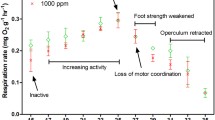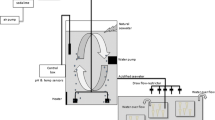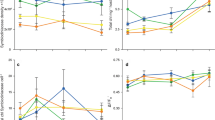Abstract
Warming of the world’s oceans is predicted to have many negative effects on organisms as they have optimal thermal windows. In coastal waters, however, both temperatures and pCO2 (pH) exhibit diel variations, and biological performances are likely to be modulated by physical and chemical environmental changes. To understand how coastal zooplankton respond to the combined impacts of heat shock and increased pCO2, the benthic copepod Tigriopus japonicus were treated at temperatures of 24, 28, 32 and 36 °C to simulate natural coastal temperatures experienced in warming events, when acclimated in the short term to either ambient (LC, 390 μatm) or future CO2 (HC, 1000 μatm). HC and heat shock did not induce any mortality of T. japonicus, though respiration increased up to 32 °C before being depressed at 36 °C. Feeding rate peaked at 28 °C but did not differ between CO2 treatments. Expression of heat shock proteins (hsps mRNA) was positively related to temperature, with no significant differences between the CO2 concentrations. Nauplii production was not affected across all treatments. Our results demonstrate that T. japonicus responds more sensitively to heat shocks rather than to seawater acidification; however, ocean acidification may synergistically act with ocean warming to mediate the energy allocation of copepods.




Similar content being viewed by others
References
Angilletta MJ (2009) Thermal adaptation: a theoretical and empirical synthesis. Oxford University Press, Oxford
Atkin OK, Tjoelker MG (2003) Thermal acclimation and the dynamic response of plant respiration to temperature. Trends Plant Sci 8:343–351
Bierkens JGEA (2000) Applications and pitfalls of stress-proteins in biomonitoring. Toxicology 153:61–72
Burnell O, Russell B, Irving A, Connell S (2013) Eutrophication offsets increased sea urchin grazing on seagrass caused by ocean warming and acidification. Mar Ecol Prog Ser 485:37–46
Cai W-J et al (2011) Acidification of subsurface coastal waters enhanced by eutrophication. Nat Geosci 4:766–770
Capone DG, Hutchins DA (2013) Microbial biogeochemistry of coastal upwelling regimes in a changing ocean. Nat Geosci 6:711–717
Comeau S, Carpenter R, Lantz C, Edmunds P (2015) Ocean acidification accelerates dissolution of experimental coral reef communities. Biogeosciences 12:365–372
Davenport J, Barnett PRO, McAllen RJ (1997) Environmental tolerances of three species of the harpacticoid copepod genus Tigriopus. J Mar Biol Assoc UK 77:3–16
Davison IR, Pearson GA (1996) Stress tolerance in intertidal seaweeds. J Phycol 32:197–211
Dickson AG (1990) Standard potential of the reaction: AgCl(s) + ½ H2(g) = Ag(s) + HCl(aq), and the standard acidity constant of the ion HSO4 − in synthetic seawater from 273.15 to 318.15 K. J Chem Thermodyn 22:113–127
Duarte CM et al (2013) Is ocean acidification an open-ocean syndrome? Understanding anthropogenic impacts on seawater pH. Estuar Coast 36:221–236
Dupont S, Thorndyke MC (2008) Ocean acidification and its impact on the early life-history stages of marine animals. In: Briand F (ed) Impacts of acidification on biological, chemical and physical systems in the Mediterranean and Black Seas. CIESM Monographs, Monaco, pp 89–97
Feder ME, Hofmann GE (1999) Heat-shock proteins, molecular chaperones, and the stress response: evolutionary and ecological physiology. Annu Rev Physiol 61:243–282
Frost BW (1972) Effects of size and concentration of food particles on the feeding behavior of the marine planktonic copepod Calanus pacificus. Limnol Oceanogr 17:805–815
Gao K, Aruga Y, Asada K, Ishihara T, Akano T, Kiyohara M (1993) Calcification in the articulated coralline alga Corallina pilulifera, with special reference to the effect of elevated CO2 concentration. Mar Biol 117:129–132
Garrabou J et al (2009) Mass mortality in Northwestern Mediterranean rocky benthic communities: effects of the 2003 heat wave. Glob Change Biol 15:1090–1103
Helmuth B et al (2006) Mosaic patterns of thermal stress in the rocky intertidal zone: implications for climate change. Ecol Monogr 76:461–479
Helmuth B et al (2014) Beyond long-term averages: making biological sense of a rapidly changing world. Clim Change Responses 1:6
Hildebrandt N, Niehoff B, Sartoris FJ (2014) Long-term effects of elevated CO2 and temperature on the Arctic calanoid copepods Calanus glacialis and C. hyperboreus. Mar Pollut Bull 80:59–70
Hofmann GE, Todgham AE (2010) Living in the now: physiological mechanisms to tolerate a rapidly changing environment. Annu Rev Physiol 72:127–145
Hu J, Fu Z, Wu L (1988) Tidal residual circulation in the regular semidiurnal tide. J Xiamen Univ (Nat Sci) 27:323–327
Hwang D-S et al (2010) Modulation of p53 gene expression in the intertidal copepod Tigriopus japonicus exposed to alkylphenols. Mar Environ Res 69:S77–S80
Jentsch A, Kreyling J, Beierkuhnlein C (2007) A new generation of climate-change experiments: events, not trends. Front Ecol Environ 5:365–374
Jung S-O et al (2006) The complete mitochondrial genome of the intertidal copepod Tigriopus sp. (Copepoda, Harpactidae) from Korea and phylogenetic considerations. J Exp Mar Biol Ecol 333:251–262
Kim J-M, Lee K, Yang EJ, Shin K, Noh JH, K-t Park, Hyun B, Jeong H-J, Kim J-H, Kim KY (2010) Enhanced production of oceanic dimethylsulfide resulting from CO2-induced grazing activity in a high CO2 world. Environ Sci Technol 44:8140–8143
Kurihara H, Shimode S, Shirayama Y (2004) Effects of raised CO2 concentration on the egg production rate and early development of two marine copepods (Acartia steueri and Acartia erythraea). Mar Pollut Bull 49:721–727
Kwok KWH, Leung KMY (2005) Toxicity of antifouling biocides to the intertidal harpacticoid copepod Tigriopus japonicus (Crustacea, Copepoda): effects of temperature and salinity. Mar Pollut Bull 51:830–837
Lee K-W, Raisuddin S, Hwang D-S, Park HG, Dahms H-U, Ahn I-Y, Lee JS (2008) Two-generation toxicity study on the copepod model species Tigriopus japonicus. Chemosphere 72:1359–1365
Lemoine NP, Burkepile DE (2012) Temperature-induced mismatches between consumption and metabolism reduce consumer fitness. Ecology 93:2483–2489
Lewis E, Wallace DWR (1998) Program developed for CO2 system calculations. Carbon Dioxide Information Analysis Center, Oak Ridge National Laboratory, US Department of Energy, Oak Ridge, Tennessee
Li W, Gao K (2012) A marine secondary producer respires and feeds more in a high CO2 ocean. Mar Pollut Bull 64:699–703
Lima FP, Wethey DS (2012) Three decades of high-resolution coastal sea surface temperatures reveal more than warming. Nat Commun 3:704
Machida RJ, Miya MU, Nishida M, Nishida S (2002) Complete mitochondrial DNA sequence of Tigriopus japonicus (Crustacea: Copepoda). Mar Biotechnol 4:406–417
Marine Biological Laboratory, Fujian Institute of Oceanology, Division of Marine Biology, Dept. of Biology, Amoy University (1960) Studies on the littoral ecology of Amoy and its vicinity. J Xiamen Univ (Nat Sci) 3:74–95
Marshall DJ, Dong YW, McQuaid CD, Williams GA (2011) Thermal adaptation in the intertidal snail Echinolittorina malaccana contradicts current theory by revealing the crucial roles of resting metabolism. J Exp Biol 214:3649–3657
McAllen R, Taylor AC, Davenport J (1999) The effects of temperature and oxygen partial pressure on the rate of oxygen consumption of the high-shore rock pool copepod Tigriopus brevicornis. Comp Biochem Physiol A Mol Integr Physiol 123:195–202
Melzner F, Göbel S, Langenbuch M, Gutowska MA, Pörtner H-O, Lucassen M (2009) Swimming performance in Atlantic Cod (Gadus morhua) following long-term (4–12 months) acclimation to elevated seawater PCO2. Aquat Toxicol 92:30–37
Melzner F et al (2013) Future ocean acidification will be amplified by hypoxia in coastal habitats. Mar Biol 160:1875–1888
Mislan K, Helmuth B, Wethey DS (2014) Geographical variation in climatic sensitivity of intertidal mussel zonation. Global Ecol Biogeogr 23:744–756
Munday PL, Dixson DL, Donelson JM, Jones GP, Pratchett MS, Devitsina GV, Døving KB (2009) Ocean acidification impairs olfactory discrimination and homing ability of a marine fish. Proc Natl Acad Sci USA 106:1848–1852
Ohtsuka K, Hata M (2000) Molecular chaperone function of mammalian Hsp 70 and Hsp 40-a review. Int J Hyperth 16:231–245
Parker LM, Ross PM, O’Connor WA (2009) The effect of ocean acidification and temperature on the fertilization and embryonic development of the Sydney rock oyster Saccostrea glomerata (Gould 1850). Glob Chang Biol 15:2123–2136
Perry AL, Low PJ, Ellis JR, Reynolds JD (2005) Climate change and distribution shifts in marine fishes. Science 308:1912–1915
Pfaffl MW (2001) A new mathematical model for relative quantification in real-time RT-PCR. Nucleic Acids Res 29:e45
Pörtner HO (2012) Integrating climate-related stressor effects on marine organisms: unifying principles linking molecule to ecosystem-level changes. Mar Ecol Prog Ser 470:273–290
Pörtner HO, Farrell AP (2008) Physiology and climate change. Science 322:690–692
Pörtner HO, Bock C, Reipschläger A (2000) Modulation of the cost of pHi regulation during metabolic depression: a 31P-NMR study in invertebrate (Sipunculus nudus) isolated muscle. J Exp Biol 203:2417–2428
Pörtner HO, Dupont S, Melzner F, Storch D, Thorndyke M (2010) Studies of metabolic rate and other characters across life stages. In: Riebesell U, Fabry VJ, Hansson L, Gattuso J-P (eds) Guide to best practices ocean acidification and data reporting. Publications Office of the European Union, Luxembourg, pp 137–165
Raisuddin S, Kwok KW, Leung KM, Schlenk D, Lee JS (2007) The copepod Tigriopus: a promising marine model organism for ecotoxicology and environmental genomics. Aquat Toxicol 83:161–173
Rhee J-S et al (2009) Heat shock protein (Hsp) gene responses of the intertidal copepod Tigriopus japonicus to environmental toxicants. Comp Biochem Physiol C Toxicol Pharmacol 149:104–112
Ries JB, Cohen AL, McCorkle DC (2009) Marine calcifiers exhibit mixed responses to CO2-induced ocean acidification. Geology 37:1131–1134
Rosenzweig C et al (2008) Attributing physical and biological impacts to anthropogenic climate change. Nature 453:353–357
Roy RN et al (1993) The dissociation constants of carbonic acid in seawater at salinities 5 to 45 and temperatures 0 to 45 C. Mar Chem 44:249–267
Russell BD, Harley CD, Wernberg T, Mieszkowska N, Widdicombe S, Hall-Spencer JM, Connell SD (2012) Predicting ecosystem shifts requires new approaches that integrate the effects of climate change across entire systems. Biol Lett 8:164–166
Russell BD, Connell SD, Findlay HS, Tait K, Widdicombe S, Mieszkowska N (2013) Ocean acidification and rising temperatures may increase biofilm primary productivity but decrease grazer consumption. Philos Trans R Soc Lond B Biol Sci 368:20120438
Sabine CL et al (2004) The oceanic sink for anthropogenic CO2. Science 305:367–371
Sanford E, Kelly MW (2011) Local adaptation in marine invertebrates. Annu Rev Mar Sci 3:509–535
Sokolova IM, Frederich M, Bagwe R, Lannig G, Sukhotin AA (2012) Energy homeostasis as an integrative tool for assessing limits of environmental stress tolerance in aquatic invertebrates. Mar Environ Res 79:1–15
Somero GN (2010) The physiology of climate change: how potentials for acclimatization and genetic adaptation will determine ‘winners’ and ‘losers’. J Exp Biol 213:912–920
Stearns DE (1986) Copepod grazing behavior in simulated natural light and its relation to nocturnal feeding. Mar Ecol Prog Ser 30:65–76
Stillman JH, Somero GN (2000) A comparative analysis of the upper thermal tolerance limits of eastern Pacific porcelain crabs, genus Petrolisthes: influences of latitude, vertical zonation, acclimation, and phylogeny. Physiol Biochem Zool 73:200–208
Stocker TF et al (2013) Climate change 2013: the physical science basis. In: Intergovernmental panel on climate change, working group I contribution to the IPCC Fifth Assessment Report (AR5). Cambridge University Press, New York
Thomsen J, Melzner F (2010) Moderate seawater acidification does not elicit long-term metabolic depression in the blue mussel Mytilus edulis. Mar Biol 157:2667–2676
Thor P, Oliva EO (2015) Ocean acidification elicits different energetic responses in an Arctic and a boreal population of the copepod Pseudocalanus acuspes. Mar Biol 162:799–807
Tomanek L, Somero GN (2000) Time course and magnitude of synthesis of heat-shock proteins in congeneric marine snails (Genus Tegula) from different tidal heights. Physiol Biochem Zool 73:249–256
Tunnicliffe V, Davies KT, Butterfield DA, Embley RW, Rose JM, Chadwick WW Jr (2009) Survival of mussels in extremely acidic waters on a submarine volcano. Nat Geosci 2:344–348
Uye S (2005) A brief review of mass culture of copepods used for fish food in Japanese mariculture and a proposed plan to use high biomass natural populations of brackish-water copepods. In: Lee C, O’Bryen PJ, Marcus NH (eds) Copepods in aquaculture. Blackwell Publishing, Oxford, pp 75–90
Wernberg T, Smale DA, Thomsen MS (2012) A decade of climate change experiments on marine organisms: procedures, patterns and problems. Glob Change Biol 18:1491–1498
Willmer P, Stone G, Johnston I (2005) Environmental physiology of animals. Blackwell, Malden
Wood HL, Spicer JI, Widdicombe S (2008) Ocean acidification may increase calcification rates, but at a cost. Proc R Soc Lond B Biol Sci 275:1767–1773
Wootton JT, Pfister CA, Forester JD (2008) Dynamic patterns and ecological impacts of declining ocean pH in a high-resolution multi-year dataset. Proc Natl Acad Sci USA 105:18848–18853
Zervoudaki S, Frangoulis C, Giannoudi L, Krasakopoulou E (2013) Effects of low pH and raised temperature on egg production, hatching and metabolic rates of a Mediterranean copepod species (Acartia clausi) under oligotrophic conditions. Mediterr Mar Sci 15:74–83
Acknowledgments
This study was supported by National Natural Science Foundation (Nos. 41430967; 41120164007), Joint project of NSFC and Shandong province (Grant No. U1406403), Strategic Priority Research Program of CAS (Grant No. XDA11020302), SOA (GASI-03-01-02-04) and China–Japan collaboration project from MOST (S2012GR0290). YWD is funded by Program for New Century Excellent Talents of Ministry of Education, China. BDR is funded by an Australian Research Council Discovery Grant. WL and BDR are funded by MEL Visiting Fellowship of State Key Laboratory of Marine Environmental Science, Xiamen University. We would like to thank Dr. Guizhong Wang (Xiamen University, China) for providing Tigriopus japonicus; we also thank Yahe Li and Nana Liu (Xiamen University, China) for their kind assistance during the experiments.
Author information
Authors and Affiliations
Corresponding author
Ethics declarations
Ethical standard
This study used copepod as material. All procedures performed in studies involving copepod were in accordance with the ethical standards of the institution or practice at which the studies were conducted.
Conflict of interest
The authors declare that they have no conflict of interest.
Additional information
Communicated by H. Pörtner.
Reviewed by undisclosed experts.
Rights and permissions
About this article
Cite this article
Li, W., Han, G., Dong, Y. et al. Combined effects of short-term ocean acidification and heat shock in a benthic copepod Tigriopus japonicus Mori. Mar Biol 162, 1901–1912 (2015). https://doi.org/10.1007/s00227-015-2722-9
Received:
Accepted:
Published:
Issue Date:
DOI: https://doi.org/10.1007/s00227-015-2722-9




